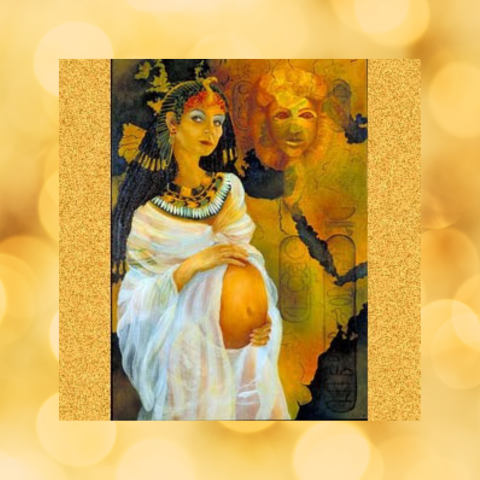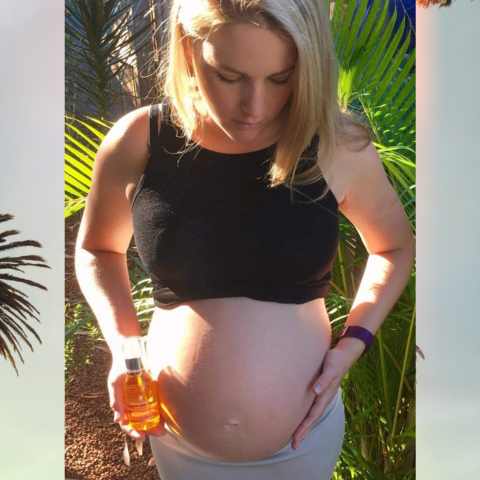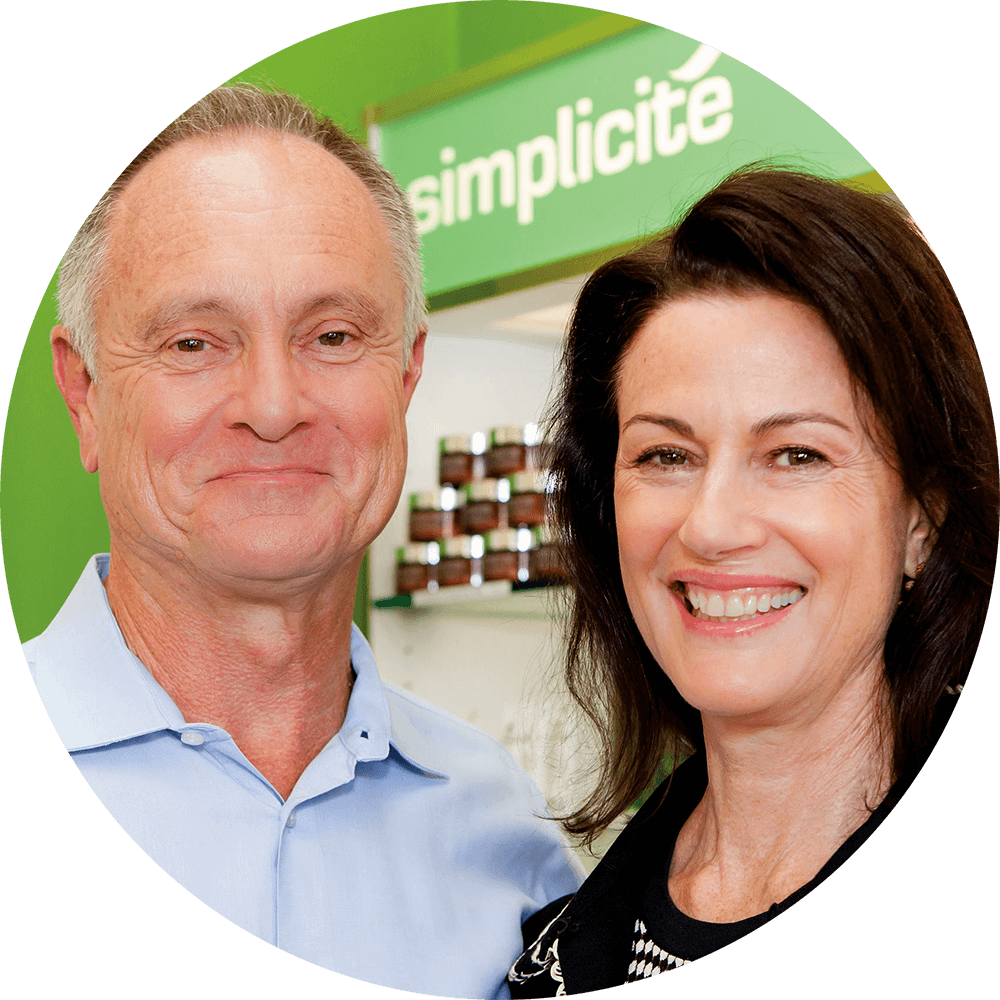Women have used essential oils to nourish their skin during pregnancy for all of human history - despite what five minutes on Google would have you believe.
Encouraged by their mothers and their mothers before them, pregnant women in ancient India, Greece, Rome and Egypt are known to have used nourishing, aromatic plant extracts to help prepare them for childbirth and motherhood.
Egypt’s queen of seduction, Cleopatra, was famously devoted to her essential oils. She surely rubbed a little myrrh into her blossoming belly on the barge back up the Nile with Caesar.

Cleopatra and her blossoming belly
But lately, unfounded and much repeated myths about essential oils being harmful to an unborn baby have pushed aside the centuries-old wisdom of plant extracts helping pregnant women.
The distorted facts flourish online
Misinformation abounds about safety of using essential oils in pregnancy.
Always, the misinformation is out-of-context 'warnings' about plants and herbs that are said to cause dangerous outcomes. And always, those outcomes are in fact caused by giving massive doses, at extremely high concentrations - usually in experiments perfomed in a lab petri dish (in vitro) or on laboratory mice (in vivo).
These sorts of concentrated preparations have nothing to do with the very low-dose exposures to essential oils in aromatherapy and skin products
Simplicité founder, herbalist and clinical naturopath David Lyons, is frustrated by the distorted facts about using essential oils during pregnancy that flourish online.
“After more than 30 years of reading published scientific journals, I’m disheartened at the way a 'grain of truth' is so often cherry-picked from various articles, then quoted way out of context where it causes unnecessary concern,” he says.
“It’s a complete distraction from the most important issue in pregnancy, which is nutrition in the months prior and during pregnancy.”
Research is key
David, who treated cancer patients at the Royal Brisbane Hospital for seven years prior to training as a naturopath and herbalist, researches widely before using ingredients in his products.
On the subject of essential oils and aromatherapy, he turns to the US Food and Drug Administration and specifically its GRAS list, which stands for the phrase “generally recognised as safe”.
Essential oils are substances that have been around for a very long time with no record of causing ill health.
All the familiar aromatherapy oils, including sage, rosemary, ginger and peppermint, can be found on the FDA’s GRAS list.
“While the GRAS list doesn’t specifically mention miscarriage or birth defects or any of those specific concerns that trouble pregnant women, there isn’t a single study that gives any evidence that should worry them either,” David says.
“Despite internet conjecture, not one essential oil is said to have caused a pregnancy termination or a birth defect".
“The very few recorded instances of minor problems with essential oils worldwide are difficult to confirm as the patient was usually found to have ingested an adulterated essential oil, instead of inhaling it through aromatherapy or absorbing it through their skin.”
Another reputable place to search for peer-reviewed scientific studies is the National Centre for Biotechnology Information (NCBI), which is part of the United States National Library of Medicine at the National Institutes of Health, one of the world’s foremost medical research centres.
If ever a study was published somewhere in the world, and it's reliable, it’s to be found here.
But David says it is usually pointless looking for studies that prove the safety of substances that have been in use for thousands of years.
“The studies probably don’t exist and it’s easy to understand why,” he says. “Studies to ‘prove’ safety are usually only instigated when enough anecdotal evidence begins to point to a possible problem.
There is no anecdotal or other 'evidence' because essential oils have never posed a problem. That's why there are no studies!"
The dose makes the poison
David’s oft-repeated phrase “it’s the dose that makes the poison” applies here.
“Botulinum toxin is 10,000 to 40,000 times more toxic than the venom of an eastern brown snake, the second most venomous land snake in the world. Nonetheless, no one is put at risk by using Botox because the dose injected is not the toxic dose.”
"Otherwise, why would women willingly pay to be injected with Botox, made from the most lethal toxin known to mankind: Botulinum toxin?” he asks.
Use of essential oils during pregnancy is as safe as smelling roses
David warns against taking advice from non-scientific agencies such as the National Association for Holistic Aromatherapy.
“Their ideas certainly don’t appear on any of the millions of NCBI pages, the world’s most reliable, scientific, peer-reviewed resource,” he says.
“I must admit to complete frustration whenever the issue of misinformation about essential oils and pregnancy arises.
“If these out-of-context warnings by the holistic association were applied across all low-dose exposures to essential oils, it would mean that pregnant women couldn’t stop and smell the roses in their garden each day because rose essence contains benzyl alcohol, which is known to be severely toxic in high doses.
“Nor could they clean their teeth, as peppermint oil is toxic in doses higher than 168 grams. Yet common sense tells us it is safe to use peppermint toothpaste twice daily.”
Mother knows best about using essential oils during pregnancy
David absolutely recommends using aromatherapy essences and specially formulated massage oils to aid with growth and transformation during pregnancy.
“Since 1992, we have sold tens of thousands of our products to mums-to-be, without any issue arising,” he says.
“This includes my wife Robin and the other mums who have worked here at Simplicité.”

Pregnancy Massage Oil restores elasticity to stretched skin
After all, many of the essential oils in question derive from common fruits and herbs like lemon, oregano, thyme and rosemary.
“And over how many centuries have Italian women had basil and pesto in their diet during pregnancy?” David asks.
“I think that perspective needs to be maintained when it comes to discussing health risks during pregnancy.”
Our pregnancy products
At Simplicité, we are meticulous in creating the concentrated, medicinal-grade plant extracts that go into our certified organic products. Our products handcrafted from plant extracts that are easily absorbed, high in quality, and in concentrations designed to produce the desired effect.
We are a cruelty-free, vegan brand accredited by PETA Beauty without Bunnies.
Simplicité Pregnancy Massage Oil is designed to restore elasticity to areas at risk of stretch marks when applied twice daily . It features 12 beneficial plant extracts: Apricot Kernel, Avocado, Wheatgerm, Hazelnut, Calendula and Rosehip oils along with the calming aromatic properties of Orange, Neroli, Mandarin, Ginger, Patchouli and Sandalwood.
Also hightly recommended is Toning Invigorating Body Oil, which when rubbed over tummy, breasts, thighs and buttocks, tones skin and dramatically improves the appearance of stretch marks. 11 effective herbal extracts include Basil - tones and revitalises skin, Rosemary - reduces fluid retention, and Jojoba - improves suppleness, tone and texture.

